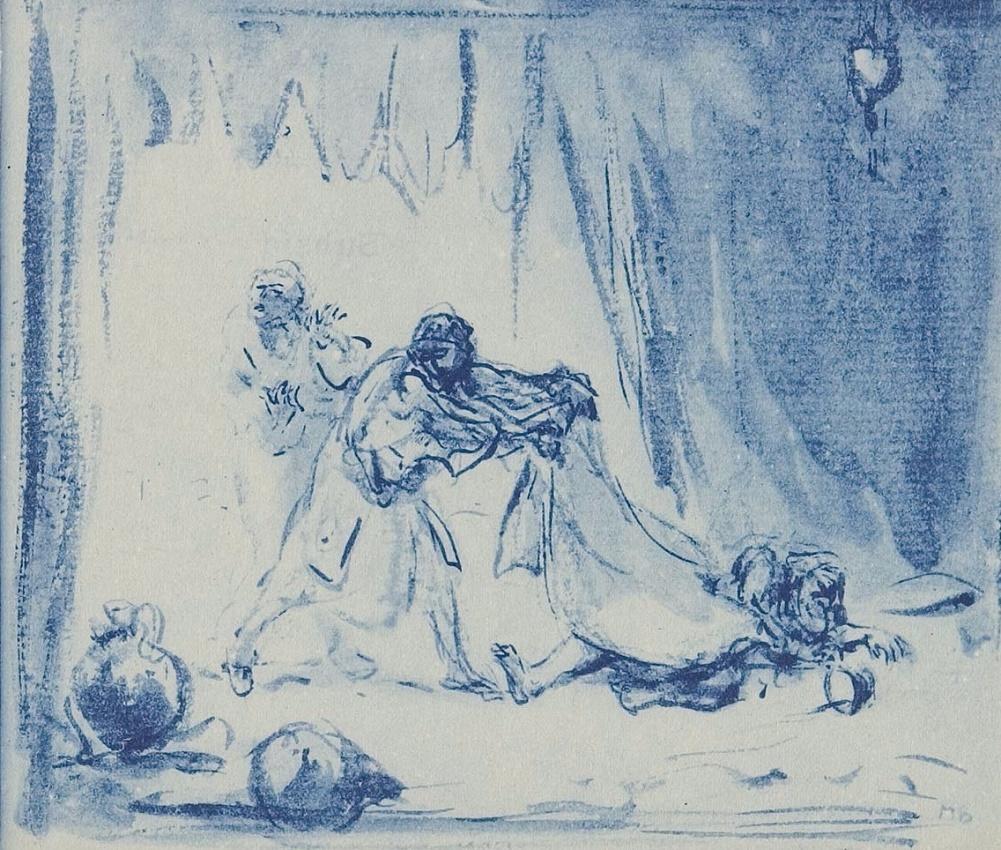Here the Rebbe provides a kind of litmus test for righteousness… * When we are no longer bogged down in the mire of the world, we are available to focus on bettering the world around us. Now our attention is directed to only positivity, seeing signposts to light up and blaze our path.
By Rabbi Boruch Merkur
 Shem and Japhet cover Noah. Artist: Marius Bauer 1882-1914. National Library of the Netherlands.
Shem and Japhet cover Noah. Artist: Marius Bauer 1882-1914. National Library of the Netherlands.
What kind of tzaddik do you have to be to face the world unaffected? Must you be a Lamed-Vov to remain unsullied in the streets, a no-need-for-rainbows, uniquely righteous servant of G-d?
Chassidus teaches of an enhanced state of awareness attained when the soul rules over the body, a mindset that lifts the person above spiritual obstacles:
In this instance, the soul has dominion and command over the body. This person sees only what the soul wishes to see. When something is not in line with the soul’s volition, he does not see it.
In the simple sense, one averts his eyes from anything offensive. But the more subtle, sophisticated approach is when one sees no negativity at all. The latter applies to great tzaddikim. Whatever they don’t need to see, they don’t see at all. This selective perception is described in the story about Reb Nachum Chernobyler regarding “milk that Gentiles produced and no Jew sees it” – meaning literally “no Jew sees it.” That is, the Jew doesn’t see it at all – whatever they don’t need to see, etc.
The ability to literally not see the opposite of G-dliness is achieved through kabbalas ol malchus Shamayim, devotion to G-d’s will.
Imagine two people walking, one of whom is devout. Upon confronting something offensive, the other man sees and is affected, requiring great effort to rid himself of his negative emotional response, whereas the devout man doesn’t even see it … This selective perception is borne of kabbalas ol malchus Shamayim, which means shibud, devotional servitude. He subjects himself only to Elokus, Divinity, and nothing else at all.
(Maamer Ki Naar Yisroel, Hemshech 5666, pg. 581)
***
Do you walk in the street like the Rebbe, your head up, proud to be G-d’s emissary? Or are you brought down by billboards, immodest dress, the crass talk of strangers you cannot help but hear…
Or can you? Or is that power reserved for the righteous few?
Two of Noach’s sons were worthy to cover him when he was exposed in his tent. The Torah does not suffice to tell us “u’p’neihem acharonis – their faces were turned away”; it adds, “v’ervas avihem lo ra’u – but their father’s nakedness they did not see”:
They did not “see” or “perceive” “nakedness” or a deficiency in their father. Their entire experience and focus was that they needed to act to cover “their father(‘s nakedness),” but “their father’s nakedness” – unto itself – “they did not see.”
(Likkutei Sichos Vol. 10, pg. 28)
When one is shown (from On High) something that needs correcting (in another) it is an instruction that he must get involved to fix it. [Here he does not judge at all; he merely assesses the situation and acts.] But when one is shown something “negative,” this teaches that the evil exists within him [the observer], and he must correct it in himself. For were he himself at the level of tzaddik (at least with regard to this particular matter), he would not see or pay especial attention to the negativity.
(Ibid)
Here the Rebbe provides a kind of litmus test for tzidkus, righteousness. If we see an opportunity to help another, we act on this hint from On High without judgment. But if we are preoccupied with the negativity, we should really be looking inside and fixing ourselves. When we see no negativity, we’re much more in line with the Supernal Will, with tzidkus.
By embracing this spiritual sensitivity, we are no longer bogged down in the mire of the world. We are then available to focus on bettering the world around us. Now our attention is directed to only positivity, seeing signposts to light up and blaze our path.
And when we bring meaning and purpose to everything we do, including the most commonplace and mundane things – “V’Yaakov halach l’darko” – we can actually come to understand and relate to the very essence of G-d. There resides His essential love for the Jewish people – “Ki naar Yisroel v’ohaveihu.” ■